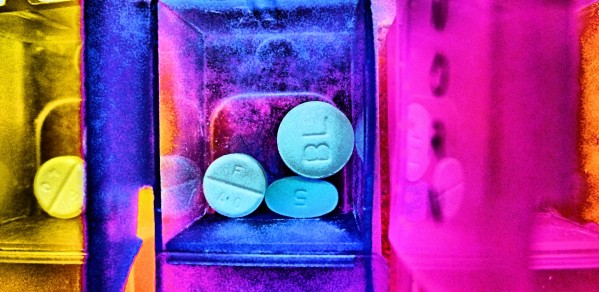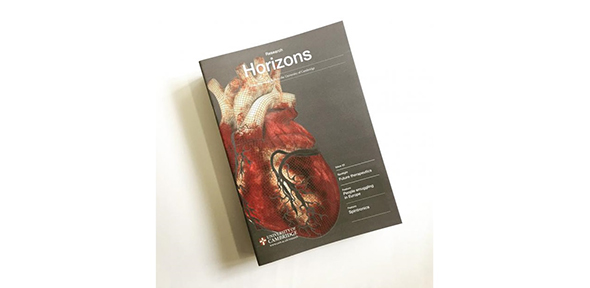
Researchers are working with pharmaceutical companies to make improvements across the whole supply chain, from how a pill is made to the moment it is swallowed by the patient.
We are already able to ‘print’ tablet medicines on demand, and we are now exploring whether this might take place at more local sites, or at the local pharmacy or even in our own homes.
Dr Jag Srai
“Like many people of my age, I have to take pills morning and night. I’m pretty good at taking them in the evenings, mainly because my wife makes me! But, left to my own devices in the mornings, I only remember to take them perhaps one day out of four,” says Dr Jag Srai.
“Wouldn’t it be fantastic if smartphones could remind patients, capture use and track activity, blood pressure, sugar level, and so on? And if, at the same time, their GP could see this data and call them in if there’s a problem?”
He explains that upwards of 30% of prescribed drugs are not taken by patients and, in the case of respiratory drugs, where application is more intricate, 70% are not taken as directed. The numbers vary depending on the type of condition being treated but they are disarmingly high across the board. This has consequences, and not only for the patient. The cost to the taxpayer of drugs that are not being used is considerable and reduces the pot of money available for patient care.
“In a world of scarce resources this in itself seems incredibly wasteful. But there are other reasons to be concerned,” adds Dr Srai, who is Head of the Institute for Manufacturing (IfM)’s Centre for International Manufacturing. “Around 50% of patients taking antibiotics don’t complete the course. The consequences of this are potentially catastrophic as infections become increasingly resistant to drug treatment. And drugs contain active ingredients which, when disposed of inappropriately, end up as contaminants in our water supply.”
A tailored approach to medicine
Tackling the thorny problem of patient compliance is just one aspect of the pharmaceutical industry that Dr Srai and his team at the IfM are looking to revolutionise. They are working with other universities and major UK pharmaceutical companies AstraZeneca and GSK to make improvements across the whole supply chain, from how a pill is made to the moment it’s swallowed by the patient.
Advances in genetics and biochemistry are helping us move towards a much more tailored approach to medicine, focused on more targeted or niche patient populations, and ultimately the development of bespoke treatments to meet individual patient needs. The implications for how the pharmaceutical industry manufactures its medicines and gets them to the patient are clearly immense.
Most pharmaceutical manufacturing still takes place in huge factory complexes, where large volumes of chemicals are processed in a series of ‘batch-processing’ steps, and often a dozen or more are required to produce the final oral dose tablet. Developing new drugs is an expensive business and so big pharma companies hope for a ‘blockbuster’ drug – a medicine that could be used to treat a very common condition, such as asthma or high blood pressure, and which can be manufactured in large quantities.
But, says Dr Srai, the manufacture of these blockbuster drugs is becoming a thing of the past. The batch process is costly, inefficient and makes less sense when producing medicines in small volumes.
New ‘continuous’ manufacturing processes mean that drugs can be made in a more flow-through model, requiring fewer steps in the manufacturing process, and in volumes better aligned with market demand. In the case of small volume manufacture, this technology breakthrough can support the move towards more personalised medicine.
“Combine this with the way in which digital technologies are transforming supply chains – through flexible production and automation, using sensors to track location, quality and authenticity, and big data analytics on consumption patterns – and it’s clear that the pharmaceutical industry is on the cusp of a huge change,” adds Dr Srai.
Read more about research on future therapeutics in Research Horizons magazine.
Recognising this, and to make sure they harness the value these advances in science and technology can deliver, pharmaceutical companies are working together in a number of ‘pre-competitive forums’.
The IfM team is playing a key part in two major related UK initiatives: the Continuous Manufacturing and Crystallisation (CMAC) Future Manufacturing Research Hub based at Strathclyde University, funded by £10m from the Engineering and Physical Sciences Research Council and a further £31m from industry; and REMEDIES, a £23m UK pharmaceutical supply-chain sector project, jointly funded by government and industry.
CMAC is focused on the move to continuous manufacturing and REMEDIES on developing new clinical and commercial supply chains. Srai’s team is leading the work on mapping the existing supply chains for different types of treatment, and modelling what the future might look like.
“We can envisage a future in which for some medicines, production is no longer a highly centralised large-scale batch operation but one where manufacturing is more about continuous processing, more distributed in nature, smaller scale and closer to the point of consumption.”
Asked how local this can become, Dr Srai adds: “In some instances we are already able to ‘print’ tablet medicines on demand, and we are now exploring whether this might take place at more local production/distribution sites, or at the local pharmacy or even in our own homes. Of course, some critical hurdles still need to be overcome, not least in terms of assuring product quality at multiple sites and establishing appropriate regulatory regimes.
“New technologies are also opening up other possibilities in the way that patients receive healthcare. Wearable and smartphone apps could be feeding diagnostic and health information to our doctors – be they human or (with the advances in artificial intelligence) robot – who would assess our symptoms remotely. We may change our consultation habits completely and only go to the doctor for very specific types of treatment. Indeed, in the UK today, trials suggest some 30% of GP visits are unnecessary.”
Using new technologies
As part of the REMEDIES project, the IfM team has been exploring the possibilities presented by technologies that are available now such as Quick Response (QR) codes that can be scanned by mobile apps on our smart phones – and how they can help ensure that patients are taking their medicine.
“A relatively easy thing to do with packaging is to use it as an information source for patients. For example, packs of pills come with a small leaflet that hardly anybody reads. If we want to help patients adhere to their treatment regimes, can we support them by giving them this plus more useful information in a more accessible electronic format?”
The REMEDIES team is working on a mobile phone app that will allow patients to read the instructions on their phone (in a font size and language of their choice) or listen to some explanatory audio or watch a video. “This is simple, readily available technology that could have a significant impact on compliance,” says Dr Srai.
The potential for exploiting data to deliver bespoke healthcare in the future is enormous. With smart packaging, smartphones and wearable devices, information can become increasingly dynamic and interactive. Indicators such as time, location – even mood – can affect whether and how drugs are taken; and data such as blood pressure and pulse can show the effect they have on the patient.
“As in the world of e-commerce, we are at the early stages of understanding how this consumer and patient data can inform the supply chain,” says Dr Srai. “But we can now contemplate scenarios in certain therapeutic areas, in which each dose a patient takes is fully optimised for the here and now, and manufactured continuously, or even printed on demand.”
And if the patient forgets to take it, they will, if they choose, be reminded to do so by a very insistent app.


